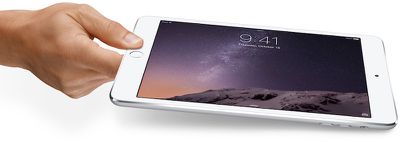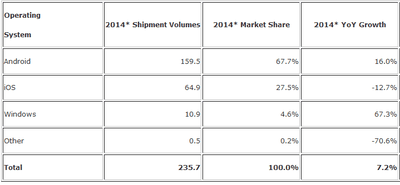The worldwide tablet tablet market is expected to see a significant decline for 2014, according to reports from the International Data Corporation. The tablet market's year-over-year growth is expected to be 7.2% this year, down from 52.5% in 2013. According to the analysts, one of the central reasons for the market slowdown is the expectation that 2014 will be the first year Apple will see a decline in iPad shipments.

IDC expects Apple to ship 64.9 million iPads this calendar year, a decline of 12.7 percent from 2013. Capturing 67.7 percent market share and shipping 159.5 million devices, Google's Android operating system will continue to be the most popular OS for tablets.
Total tablet market shipments is projected to hit 235.7 million units shipped, yielding relatively small growth of 7.2 percent over 2013. As a comparison, shipments in the worldwide tablet market saw 52.5 percent growth from 2012 to 2013. IDC equates this slowdown in growth to the longer lifespan of tablets in the modern market.

"The tablet market continues to be impacted by a few major trends happening in relevant markets," said Ryan Reith, Program Director with IDC's Worldwide Quarterly Mobile Device Trackers. "In the early stages of the tablet market, device lifecycles were expected to resemble those of smartphones, with replacement occurring every 2-3 years. What has played out instead is that many tablet owners are holding onto their devices for more than 3 years and in some instances more than 4 years. We believe the two major drivers for longer than expected tablet life-cycles are legacy software support for older products, especially within iOS, and the increased use of smartphones for a variety of computing tasks."
IDC also points towards consumer hesitancy over Windows 8 tablets for such low market shares in the total tablet and 2-in-1, or detachable, product market, a space Microsoft largely owns at the moment. Microsoft will only see about 11 million tablet shipments this year, equating to less than 5% of the overall tablet market.
"We need to look at how the tablet ecosystem is answering these challenges, and right now we see a lot of pressure on tablet prices and an influx of entry-level products, which ultimately serves Android really well," said Jean Philippe Bouchard, Research Director for Tablets. "But we also see tablet manufacturers trying to offset this price pressure by focusing on larger screens and cellular-enabled tablets. The next six months should be really interesting."
Looking forward, IDC sees a few factors that could impact the worldwide tablet market, including the overall industry reaction to Windows 10, what Google does in the tablet space with Android and Chrome OS, and the yearly potential of even more products from Apple. But, according to IDC, "Despite all of these unknowns, it seems clear that consumers can be expected to hold onto tablets longer than smartphones."
























Top Rated Comments
2. Phablets including the iPhone 6 plus are more popular than tablets.
3. Apple keeps the iPad updated. No reason to drop another $500.
4. The asking price for the 16GB 9.7" iPad is still $500.
5. The tablet is not a replacement for a computer.
6. People just don't need a tablet.
7. The market is over saturated. People that want a iPad already have an iPad.
And that is due to the lack of good input. You can work around, but it's no substitute for a touchpad and a keyboard, period.
The longer you use a tablet, the more you realize that it's a solution in search of a problem.
At first I thought that I'd lounge around the house with a tablet and not need a laptop, but even then, if you're instant messaging, or browsing, whatever.
You're always going to need to do input, and the moment you input anything more than twice, over the months, you'll realize that a laptop is simply the superior choice. It's not due to familiarity and a resistance to change. Laptops are just completely superior for the vast, vast majority of people.
Prediction: the watch will go the way of the iPad as well. Huge initial interest, relegated to a niche role after 4 years.
We need true innovations in battery life, screen technology/form factors, and sensors to make the next leap, and Apple ain't going to provide it. They'll probably buy the company that makes it and call it their own. Apple's a spit and polish type of company, and there's nothing wrong with that. Taking promising tech and mass producing it is not easy, but let's not kid ourselves--this is what they do.